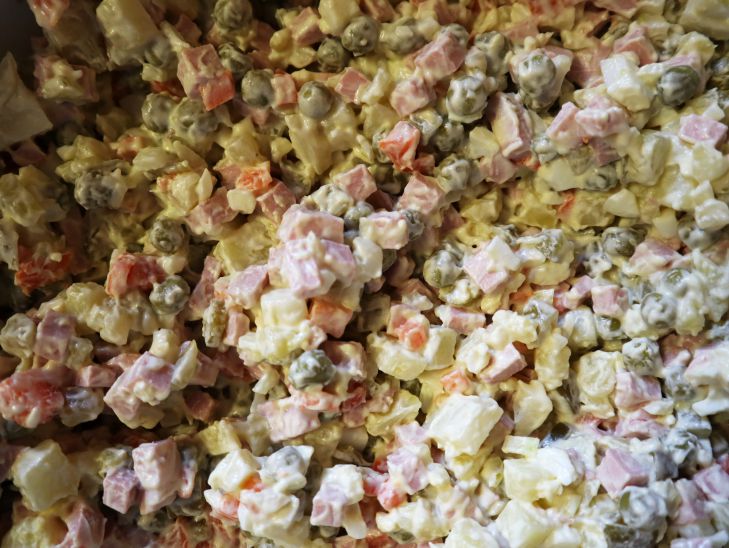A dish that once captivated aristocrats has now become a symbol of kitchen laziness. The culprit is one ingredient that shouldn't even be in the recipe.
It's not about sausage or potatoes. The main enemy of Olivier is pickles. Yes, the same ones that you proudly cut into cubes.
Their sharp brine, watery texture and aggressive acidity kill the flavor balance, turning the salad into a soggy mass with a cheap fast food taste.

Initially, the recipe did not include cucumbers or green peas. The French chef, after whom the salad is named, used capers - their delicate sourness emphasized the tenderness of hazel grouse and crayfish necks. But when the recipe was simplified to the level of Soviet canteens, capers were replaced with what was at hand.
The pickles aren't the only problem. The green peas, which are sprinkled into the bowl "for color," make the salad sickly sweet. In the original, they were replaced with asparagus, while modern cooks add avocado or marinated artichokes.
Even mayonnaise, without which Olivier is unthinkable, became an enemy. Store-bought sauce with its chemical sourness and liquid consistency turns the salad into mush. The real sauce was made from olive oil, mustard and egg yolks - it coated the ingredients without masking their taste.
Sausage is another failure. Grouse and veal tongue have disappeared from the recipe, leaving behind a cheap alternative. Smoked chicken or roast turkey will bring back the nobility of the dish, but who wants to waste time?
Potatoes and carrots, which are considered the basis, are also not sacred. Instead, you can use Jerusalem artichoke - it is less starchy, or baked beetroot - its sweetness will balance the sour notes.
Even the greens that are generously sprinkled on top are not always appropriate. Parsley and dill interrupt the aroma of meat, while microgreens or dill flowers add freshness without being intrusive.
How to fix a salad so that it becomes a delicacy again? Start by replacing the pickles with pickled gherkins. Their small size and dense texture will retain the crunch without adding excess moisture. If you feel like experimenting, soak a fresh cucumber in a mixture of vinegar and sugar - a light marinade will give the right sourness. Capers, which were once in the recipe, will bring back the piquancy, but you only need a teaspoon.
Replace green peas with green beans - boil them and cut into cubes. Avocado will add creaminess, and marinated artichokes - bitterness for gourmets.
The mayonnaise is worth making at home. Whisk two egg yolks with Dijon mustard, gradually pouring in olive oil. Add a drop of truffle oil or anchovies for depth. The sauce should be thick, like sour cream, so that it coats the ingredients, and does not drown in them.
Meat - only baked or smoked. Turkey, smoked chicken breast, lightly salted salmon - the choice depends on your courage.
Replace the potatoes with Jerusalem artichoke and the carrots with baked beetroot. Mix everything carefully, coat with sauce and let it sit for half an hour. Garnish with almond petals and a pinch of black salt.
Why does it work? The capers and gherkins don't compete for attention, but complement the meat. The homemade mayonnaise binds the flavors together without turning them into mush. The avocado and Jerusalem artichoke add complexity you wouldn't expect from a typical dish. This isn't a salad, but a culinary spectacle, where every ingredient plays its part.
Next time you cut pickles, remember that they are like a loud neighbor who ruins the whole party. Olivier deserves more than to be a hostage to Soviet traditions. It can be sophisticated, bold, unexpected. The main thing is to stop doing what everyone else does. And then even skeptics will ask: “What is this magic salad?”
